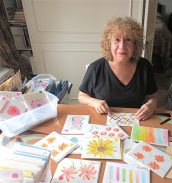By Andrew Buemi

The New York City of the 1970s, for many, represents some of the grimmest and grittiest times in the City’s modern history. The period brought economic uncertainty, increasing crime, and suburban flight. Yet, it was a time when fledgling creatives could still afford to live in Manhattan and burgeoning artists, activists, musicians, and writers came into their own before the onslaught of the AIDS epidemic.
The era conjures up eminent artists and provocateurs associated with downtown bohemia, punk, and radical thinking, including: Patti Smith, Robert Mapplethorpe, Peter Hujar, Andy Warhol, Fran Lebowitz, and Susan Sontag, to name a few. What is not as widely explored is the debauchery of the uptown crowd.
In her debut autobiographical novel, Blue Money, Janet Capron takes us on a booze-fueled, pill-popping, line-snorting journey from her upbringing as a native Upper East Side debutante turned prostitute during the 1970s.
As an only child, Janet was raised by her single mother, Maggie, and several live-in maids on Park Avenue. While the two were supported by her wealthy grandfather, the book chronicles the period in Capron’s life in which she seemed most vulnerable, from a sense of having failed to capture the validation of her absent father, Rayfield.
Early in the book, Capron’s hangout of choice is the Traveling Medicine Show, a seedy Second Avenue bar where she develops a taste for crystal meth and one of the bar’s frequent patrons, Michael, with whom she would carry on a tumultuous love affair through the years.
Through Michael, Capron met a madam named Corrine, who set her up with her first trick and introduced her to “the Life,” that is, becoming a prostitute and running with clients of her own—often straight-laced suburban fathers, husbands, financiers, and white collar executives.
Capron details her travails from the seedy haunts of the Upper East Side to downtown drug dens and gin mills with a self-awareness that is both darkly comic and jarringly wry. While she justifies her pursuits with the aegis of radical feminism, sexual liberation, and a yearning to be financially self-sufficient, Capron makes no attempt to disguise how her troubled childhood drove her to substance abuse and the pursuit of male affection at any cost.
In a poignant vignette encapsulating a sense of abandonment and rejection, Capron recounts driving upstate to her father’s stable as a child:
“We are absolutely silent the whole time. He is shifting gears in his little Carmengia and simply delighting in the drive. It never occurs to him that maybe his daughter next to him is feeling one long howling pain of rejection. Is feeling that he has so little interest in her that she, like a parcel, like a Sunday burden, is being driven up to the stable and put on a horse because she is an obligation he is now too sober to avoid.”
Capron’s writing is at once fast-paced, witty, humorous, and dark. She constructs the book using short chapters that each explore poignant moments during this period in her life. We follow her as she moves in and out of her mother’s Park Avenue apartment (and through the complicated relationship therein); suffers terrible withdrawals; is committed to a psychiatric institution; performs in a sex show; and gets married, divorced, and takes on new lovers that lead to horrible acts of violence. In doing so, Capron introduces a colorful cast of characters throughout New York City’s underbelly, from Sutton Place to the West Village.
Blue Money is not for the dainty or faint of heart, but it’s a worthwhile read for those who have lived through the 1970s of New York City (and even those who have not, like me). For all the grit, violence, and misery attached to the City during this decade, it’s my sense that today there is a sort of nostalgia for the naiveté and the camaraderie of those who came up in that hardscrabble era.
Blue Money: National Book Review’s #1 Pick of the Week!
WestView News is proud of our longtime contributor and friend, Janet Capron, whose memoir, Blue Money, is starting to take off—just as we predicted last month. Blue Money came out on June 20th, the same week that the National Book Review made it their #1 Pick of the Week! The week before that, Playboy Magazine published a frank and funny online interview with Janet, along with an excerpt from the book. Exciting!
We’ll keep you posted on this rising star. Remember, you heard it here first!
-Andreea Ioana Pantor



